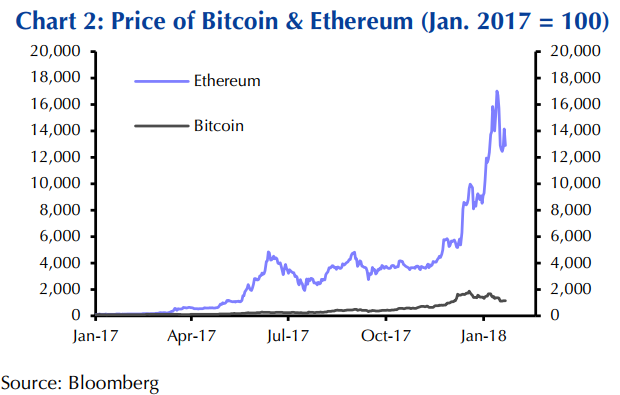A piece from Capital Economics on BTC and cryptocurrency
It argues
- Even though Bitcoin is almost certainly a bubble, the blockchain technology underpinning it has much greater potential
And asks:
- Will blockchain live up to its hype?
In brief:
... the blockchain has many useful applications
- Governments including Ukraine, Estonia and Dubai are using it to keep property registers or medical records ... Shipping group Maersk is to use it to control its supply chain ... Commodities exchanges use it to track the history and authenticity of diamonds ... blockchain could replace backoffice databases in financial services
- All of this has the potential to cut out middlemen, reduce costs, boost productivity and living standards, and facilitate trade
But
- In developed economies, transacting through central intermediaries is generally not a problem, as they are well-trusted ... people might prefer there to be a central authority to whom they have recourse ... Blockchain promises low transaction fees and avoids reliance on a central server. But transaction fees are already pretty low, while most systems have reliable server back-ups
... the technology is still in its early days and is largely untested on a very wide scale
- Bitcoin is a case in point; its technical shortcomings (e.g. long transaction times) make it impractical for very widespread use
So-called "permissioned" blockchains have got around some of these problems, but only by removing some of the blockchain's key innovations
- For example, the "R3 consortia" of banks is developing an international payments system that selects and vets participants, which avoids Bitcoin's cumbersome proof of work system, but means that the system is no longer public or entirely self-policing
CE conclude:
- As it stands, then, blockchain technology does not seem to be on a par with past so-called "general purpose technologies", such as electricity or computers, which transformed the entire economy
CE does not dismiss blockchain though, it points to
- Ethereum - which acts as a platform for blockchain applications, rather just being a currency like most of its crypto-rivals - has seen even bigger price rises than Bitcoin in recent months.
